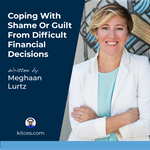
The very foundation of doing financial planning starts with gathering client information in order to produce financial plans that analyze a client’s situation and provide recommendations to help clients realize their goals. But the process of data gathering to do financial planning involves a lot more than simply gathering financial data. As while the first responsibility of the financial planning process under the CFP Board’s Standards of Conduct is to “understand the client’s personal and financial circumstances,” it is crucial for advisors to establish a solid rapport based on trust to facilitate open lines of communication in the first place. After all, identifying the issues that involve a client’s personal circumstances, along with the details of their financial goals and dreams, requires the client to have a high level of trust in their advisor to disclose their most intimate financial details and be able to comfortably talk about and explore their hopes, dreams, goals, and wishes. As a result, knowing how to ask the “right” questions that elicit trust and create rapport can be vital for financial advisors to gather the information they need – both financial and personal – to ultimately formulate the best financial planning recommendations for their clients!
In practice, there are several types of questions that advisors can strategically use to obtain information and at the same time strengthen client relationships. One type of question that encourages thoughtful reflection is the swing question, which poses situations with hypothetical phrases beginning with words such as “will”, “can”, “would”, or “could”. These are good question types to gently probe points of resistance (e.g., instead of asking “Why haven’t you called your estate planning attorney yet?”, ask “Can you tell me how it’s going with your estate planning attorney?”) or explore ideas that may be new to the client (e.g., “Could you explain your education funding ideas for your grandchildren?”). Swing questions are best used with clients with whom the advisor already has an established relationship, and can be good ways to deepen ties with the client.
Implied questions are another type of question and are generally statements structured as questions, beginning with phrases such as “I wonder…” or “You must be…”. Implied questions are a useful way to reiterate an important idea that the client has expressed, and show the advisor’s genuine interest in the topic. They also offer a good opportunity for the client to provide further details around personal situations that can impact how a financial plan should be tailored (e.g., “I wonder how you see your new employment opportunities affecting your retirement goals?”). Like swing questions, implied questions are most effective when the relationship has already been established, and can serve to enhance the rapport in those relationships.
Projective questions are open-ended questions that can be used to help clients visualize scenarios that the advisor may want the client to consider. They generally start with phrases like “What if…” or “What would…” and can help clients envision and understand new possibilities that may make sense for their financial plans. Scaling questions are another type of question and can be used to assess relative levels of a client’s interests and concerns. These are typically structured as “On a scale of x to y, where are you on that scale?” For instance, an advisor can ask their client something like, “I know you’ve expressed concerns about the recent market activity; on a scale of 1 to 10 where 1 is the calmest and 10 is the most anxious, where are you on that scale?” Both projective and scaling questions are good ways to solicit information that the advisor may be specifically interested in and can be used with any client, regardless of whether the relationship is well-established or still relatively new.
For any questions that the advisor chooses to use, it is important to be mindful of when to ask them, and when to give the client space to reflect on their answer and elaborate with details. Asking questions too rapidly without room for reflection will generally be very stressful and overwhelming for the client… feeling less like an advisor-client relationship and more like an interrogation! However, by pacing a series of questions to allow the client to digest what is being asked, and to contemplate their answer, the advisor can gather valuable information not just for financial planning purposes, but also for better understanding the client on a personal level and deepening the relationship.
Ultimately, the key point is that by choosing the right questions to ask, and pacing the questions to allow for reflection and thoughtful exploration, advisors can learn a lot about their clients to help them develop effective financial planning strategies and, in the process, enjoy deepening their relationships as well!










